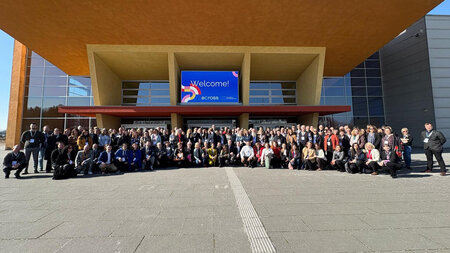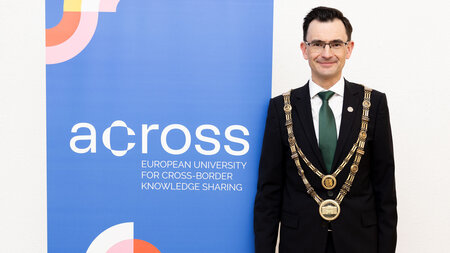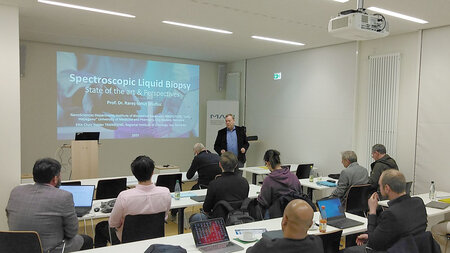Ecosystems for founders compared
A study of the Chemnitz University of Technology provides varying regional framework conditions for Start-Ups in Saxony and compares them to Start-Up strongholds such as Berlin, Hamburg and Munich
-

Results of the study are displayed on the website www.gruendeninsachsen.de . Photo montage: Mario Geißler
Start-Ups are drivers of innovation and generate jobs in promising branches, profiting the founder, the employees and the founding region. Against this background, different studies attest average start-up activities of the inhabitants in the Free State of Saxony. According to the “KfW-Gründungsmonitor 2016”, the Free State lies in the midrange of the Federal States with 14 Start-ups per 1,000 employed persons. But how exactly are the regional framework conditions for Start-Ups in Saxony? In order to visualize the situation the Juniorprofessur Entrepreneurship in Gründung und Nachfolge of the Chemnitz University of Technology, endowed chair of the Sparkasse Chemnitz, carried out the study “Start-Up Ökosystem Sachsen”. The results are now available at www.gruendeninsachsen.de .
Base of the study is the analysis of economic indicators as well as a survey of 242 founders and entrepreneurship experts in Saxony. “As there is a risk that founders migrate to more profitable regions the study investigated also the framework conditions of the German Start-up strongholds Berlin, Hamburg and Munich, besides Saxon districts and county boroughs” junior professor Mario Geißler explains.
Results show that there do exists quite some attractive and competitive ecosystems for founders in Saxony. “If we evaluate the determined data, for example, in relation to local resident employed persons as we know it from the KfW-Gründungsmonitor”, in particular aspects the prominent metropolises are even surpassed. Dresden and Leipzig reach peak values in the field of knowledge transfer. This offers potential for founding principles and qualified employees. Beneficial social structures are also provided in both cities”, says Geißler and adds: “Furthermore, the investigation reveals fields that need to be given more attention in the future. In many of Saxony’s regions potential for the financing options of innovative Start-Ups is available. Although it is easy to find associated companies that operate and are partly openly funded throughout Saxony, it is hard to find without much detour at least a few private venture capitalists and Business Angels. But those are equally important for founders as they can provide capital and Know-How. If there are such offers in the regions they are hard to find for founders outside of the private network until now.”
But also the further development of his university city is important for Geißler. The city-related analysis shows that Chemnitz scores well in the investigated facets of politics and support of founders-to-be in the Saxon comparison. Taking a look at the framework of the social structures, the city reveals a great deal of its potential. In Chemnitz only very few new ideas have the potential to become the base for a Start-up. This is shown, for example, in the research for Chemnitz Crowdfunding projects on national and international platforms. For the last six years a total amount of 28 projects could be identified. For comparison: In Dresden 271 and in Leipzig 508 projects were identified over the same period of time. Further potential is in the age distribution and artistry. Besides its unfavorable age distribution there is only a low artist ratio. The financing of innovative projects reveal the already mentioned general challenges of Saxony’s Start-Up landscape.
“I want to contribute to the improvement of Chemnitz’ framework conditions. The first step was to start the website www.gruendeninchemnitz.de . On the website I point out regional and successful founders. For the future I plan in cooperation with further partners of the city categories such as “Internship in Start-Ups” or an overview of founding-relevant events. It is supposed to contribute to the connection of the regional community. Research shows that a lively community is the central issue of a promising ecosystem”, says Geißler.
Prof. Dr. Uwe Götze, Vice-Rector for Transfer and Academic Qualification at the Chemnitz University of Technology, adds:” Here we can contribute with our Know-How of the development and expansion of the founder network SAXEED. The network that was built with the Chemnitz University of Technology in charge, already exists for ten years and is for founders in Science at already four university locations in Saxony. And the outcome is quite respectable: Since 2006 approx. 540 founding projects at our University were supervised and 140 spin-offs accompanied. Plus, lively cooperations formed during that time between regional companies, the Chemnitz Industrie- und Handelskammer and staff of the Chemnitz University of Technology such as the constantly happening regular’s table for Technology. Certainly, further founding-related conditions can be built and tested on this basis.”
Detailed study results and further information on the proceeding and background on the study are available at www.gruendeninsachsen.de.
Contact: Jun.-Prof. Dr. Mario Geißler, phone +49 371 531 36685, e-mail mario.geissler@wirtschaft.tu-chemnitz.de
Matthias Fejes
20.02.2017





